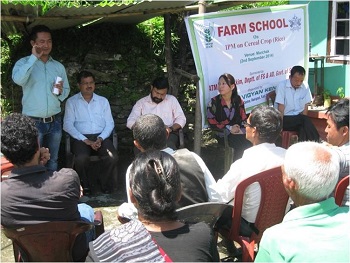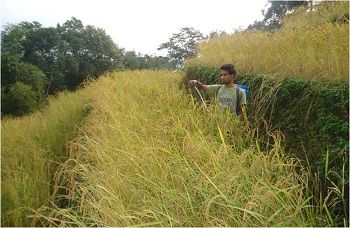Success story “ Farm school on IPM on Rice” at Sikkim
Rice is the major staple food in Sikkim. Important in providing national food security and generating employment and income for the low income people, it is regarded as a strategic commodity. Therefore, the Government included rice in the food production programme on top priority. However, rice is prone for infestation by a number of insect pests consisting sucking and defoliating insects beginning from germination to harvesting stage of the crop. Of these, some are quite serious, while others are considered as minor pests because of their sporadic nature and localized economic importance. To minimize the crop loss by these insect pests the rice growers in the region were unaware on the organic plant protection control tactics against uncertain pest attacks.
Intervention of KVK East Sikkim
KVK East Sikkim initiated a Farm School on Integrated Pest Management (IPM) on rice based on the participatory mode in collaboration with ATMA utilizing sound ecological approach aimed at optimizing control measures. Sri Indra Dahal, a progressive farmer of Marchak village, East district, Sikkim became aware on the IPM technology of rice. He was trained and developed as IPM expert in his own field by observing pests’ infestation at all critical stages of growth and development of the crop for which the detailed knowledge was provided. He was assisted in developing his analytical skills, critical thinking and creativity so that the farmer could implement pest control strategies based on the results of his field observations. The concerned expert team visited regularly under the leadership of Programme Coordinator and also encouraged the Farm School to utilize pest prevention and pest monitoring tools providing an insurance to the rice grower against as the technology that might reduce the pest damage and the risk of its failure.
Impact
After the intervention of KVK the progressive farmer of East Sikkim got an average yield of 29.2 q/ha which was much higher than the yield 20.6 q/ha (traditional practice) before intervention. He harvested rice 8-10 days before than the traditional practice planted rice, which is very important for growing next crop. According to him, the gross return was about Rs. 40,880/ha while he spent around Rs. 25,000/- as total costs of production including land preparation, input cost and labour. Hence, after adoption of KVK intervention his net return was Rs. 15,880/ ha with 1.6 B:C ratio. He has continuous interaction and feedback with this institute and State Agriculture Department. Other farmers of his village have been motivated by the success of Shri Indra Dahal. It indicated that Farm School on IPM Technology improved the process of rice production which can easily be adopted by farmers. This is also the evidence that the IPM programme was successful in the region.

